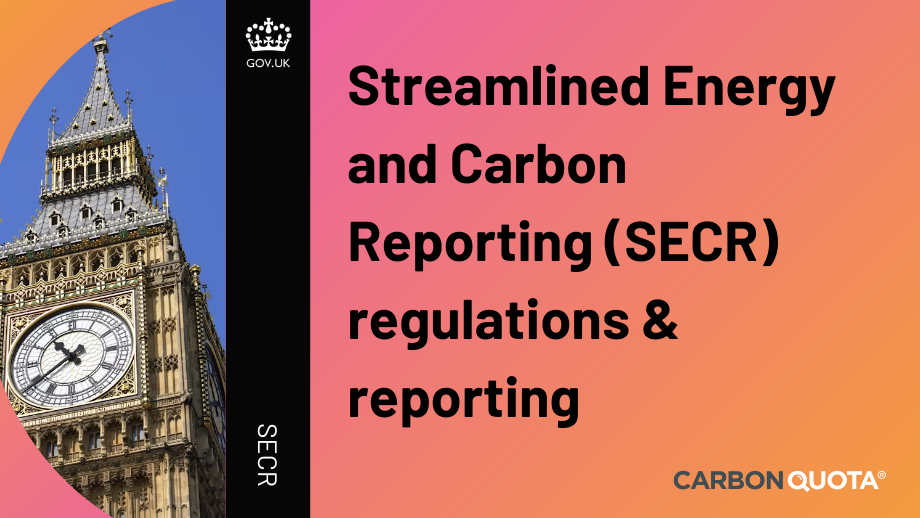Streamlined Energy and Carbon Reporting – or SECR – is a UK government framework designed to enhance the transparency of energy and carbon emissions reporting.
What is SECR?
Introduced in April 2019, SECR replaces the Carbon Reduction Commitment (CRC) Energy Efficiency Scheme and extends reporting requirements to a broader range of businesses. The initiative is part of the UK’s commitment to reducing greenhouse gas (GHG) emissions and promoting energy efficiency.
SECR aims to provide stakeholders, including customers, employees and investors with greater visibility of a company’s environmental impact. It encourages businesses to improve energy efficiency and reduce emissions while simplifying the reporting process compared to previous schemes.
What businesses are affected by SECR?
SECR applies to large UK-incorporated companies and Limited Liability Partnerships (LLPs) that meet at least two of the following criteria:
- A turnover of £36 million or more
- A balance sheet total of £18 million or more
- 250 or more employees
In addition, quoted companies, including those listed on the London Stock Exchange or an equivalent market, are also required to comply with SECR, regardless of their size.
SECR reporting obligations apply to a wide range of businesses including:
- Large retailers such as Tesco and Marks & Spencers
- Manufacturing firms like Rolls-Royce and BAE Systems
- Financial services companies such as Barclays and HSBC
- Logistics and transportation companies, including Royal Mail
- Energy suppliers such as BP and Shell
Small and medium-sized enterprises (SMEs) that do not meet the above criteria are exempt from SECR requirements. However, voluntary reporting is encouraged to promote sustainability efforts.
SECR reporting obligations
Businesses that are required to report under SECR must include specific energy and carbon data in their annual Directors’ Report (for companies) or Energy and Carbon Report (for LLPs).
The key reporting obligations include:
- Energy consumption: Total energy use in kilowatt-hours (kWh) from electricity, gas, and transport fuel and a breakdown by energy source (e.g., electricity, natural gas, company vehicle fuel)
- Greenhouse gas emissions: Carbon dioxide equivalent (CO2e) emissions from scope 1 (direct emissions) and scope 2 (indirect emissions from purchased energy)
- Scope 3 (indirect emissions from supply chain and business travel) is encouraged but not mandatory)
- Energy efficiency measures: A summary of actions taken within the financial year to improve energy efficiency, such as upgrading to LED lighting, improving insulation, or optimising machinery use
- Intensity metrics: Companies must provide at least one intensity ratio to normalise emissions data, such as CO2e per employee or CO2e per unit of revenue
- Methodology used: A description of the methodology employed to calculate energy usage and emissions, ensuring consistency and comparability across businesses.
To provide some context, a manufacturing firm may report:
- Total energy use: 50,000 MWh
- CO2e emissions: 12,000 metric tonnes
- Energy efficiency actions: Installed energy-efficient motors, reduced machinery idle time
- Intensity metric: 1.2 tonnes CO2e per £1 million revenue
Or a financial services company may report:
- Total energy use: 2,000 MWh (mainly from office buildings)
- CO2e emissions: 500 metric tonnes
- Energy efficiency actions: Transitioned to renewable electricity suppliers
- Intensity metric: 0.5 tonnes CO2e per employee
Complying with SECR is not only about meeting regulatory requirements, it demonstrates a commitment to sustainability, which can enhance brand reputation and investor confidence. Implementing energy efficiency measures can further reduce operational costs and contribute to the UK’s Net-Zero emissions target.
If your business is grappling with SECR reporting requirements – get in touch. Our platform and team of expert consultants can assist at all stages of the SECR process.
Learn more about how we can help here.



